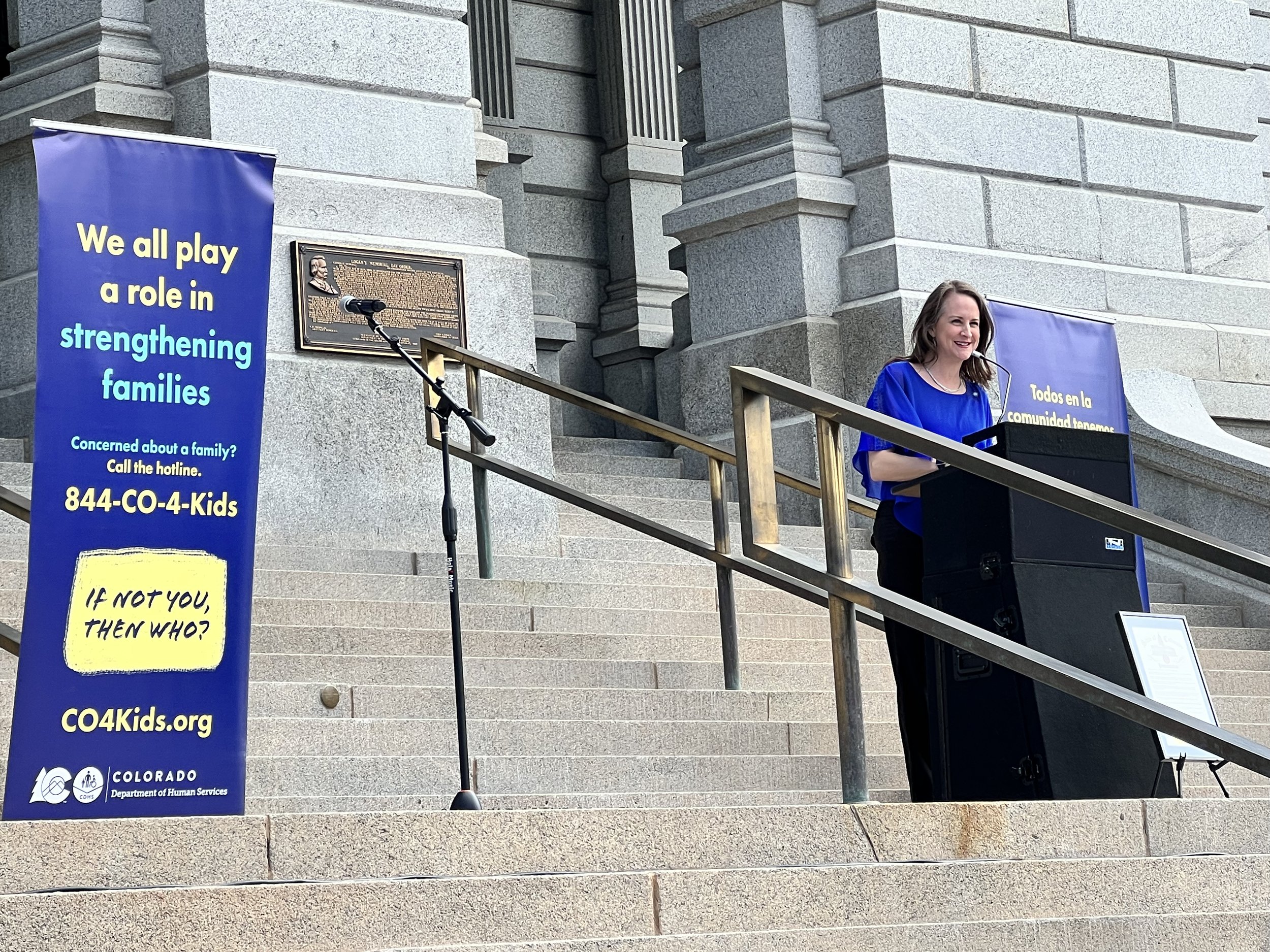Colorado leaders kick off pivotal Child Abuse Prevention Month
Story and Photos by Robert Davis
Nearly 100 people, most of whom wore blue to commemorate Child Abuse Prevention Month, attend rally in front of State Capitol.. Photo: Robert Davis
Minna Castillo Cohen, director of the Office of Children, Youth and Families at the Colo. Dept. of Human Services, addresses the crowd. Photo: Robert Davis
Colorado leaders gathered at the State Capitol on April 3 to raise awareness about child abuse prevention.
The event was attended by officials from the Colorado Department of Human Services and local nonprofits such as the Heart and Hand Center of Denver and Illuminate Colorado.
“I don’t know what I would have done without my community and the services I needed to help raise my two children,” said Minna Castillo Cohen, the director of the Office of Children, Youth, and Family in the Department of Human Services.
Mary Alice Cohen, deputy director for the Colo. Dept. of Early Childhood, addresses the crowd at the Capitol. Photo: Robert Davis
Data from the Department of Human Services shows that the number of sustained cases of child abuse in Colorado has remained relatively flat since 2020. But, the number of calls to Colorado's child abuse and neglect hotline (844-CO-4-Kids) has increased by about 8% to more than 209,500 over the same period.
State lawmakers have worked to address issues in Colorado’s child welfare system in recent years after a 2014 audit found that DHS “lacks processes” to ensure its programs are meeting their intent. For example, the audit found that more than half of child safety assessments had incorrect information about families and their histories. Another one-third of cases reviewed by the Child Fatality Review Team did not include recommendations to improve screenings or assessments, according to the audit.
For his part, Gov. Jared Polis has signed bills to allow victims to file civil lawsuits against their abusers, extended the statute of limitations to bring child abuse cases, expanded the number of people who are required to report child abuse, and created child abuse prevention training programs for early childhood education providers.
With the assistance of a translator, Lupita Cardoza, right,, talks about fleeing with her children from domestic violence. Photo: Robert Davis
Colorado has numerous community support organizations that have programs to help parents like Lupita Cardoza, who lives in Lafayette, raise their children. Cardoza enrolled at the Sister Carmen Community Center about 12 years ago while she and her children were fleeing from domestic violence. She said the center offered her group support, parenting classes, and computer classes which helped her find stability in her personal life.
Today, Cardoza is a support group leader at the Sister Carmen Center which allows her to give back to the community that helped her.
“Every parent needs a little help and support,” Cardoza said.
Research has shown that growing up in unstable housing situations can also magnify the impact of adverse childhood experiences and increase the likelihood that a child could experience homelessness at some point in their life, according to a 2019 paper by the National Health Care for the Homeless Council, a national nonprofit.
Moving forward, new state programs could help reduce instances of child abuse in Colorado. One example is the state’s universal Pre-K program that aims to expand enrollment in early childhood education. CDHS is also launching the Colorado Implementation Science Unit to better evaluate the state’s child welfare programs and improve them for the future.
“These programs are critical to setting Colorado’s kids on a path towards wellbeing,” said Mary Alice Cohen, deputy director for Colorado’s Department of Early Childhood.




